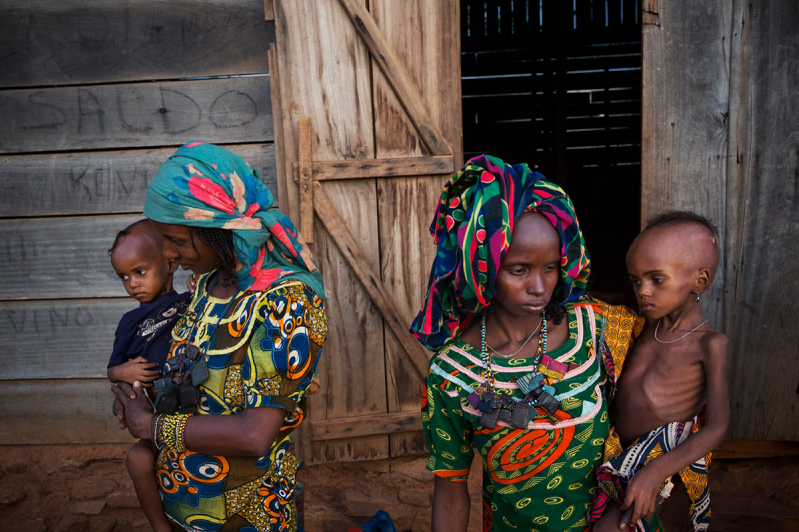
Clinging to her toy dog, 18-month-old Clemence Mokbem stares ahead as nurses rush past to tend to crying babies in the hot, overcrowded intensive care ward in a Bangui hospital.
The toddler was taken to the main children's hospital in Central African Republic's capital by her teenage mother Anita, after successive bouts of malaria led to fever and weight loss.
"I fed her but she didn't eat - she cried all night," the 16-year-old told the Thomson Reuters Foundation at the hospital.
"She's had malaria a few times, but not like that."
Despite suffering from malnutrition, diarrhea and vomiting, Clemence is starting to regain her strength, having arrived at the hospital's nutrition unit weighing only 5 kg (11 lb).
Across the Central African Republic, up to 60 children die every day due to malnutrition, according to aid organization Action Against Hunger (ACF), which runs the unit.
Three years of conflict have damaged many health facilities or left them empty and disrupted farming in a country where three in four people rely on agriculture to survive.
Half of the population do not have enough food - a number which has doubled since last year, according to the United Nations World Food Programme (WFP), which said the hunger levels across the Central African Republic were "staggeringly high".
"Malnutrition is a silent and a forgotten crisis affecting children in the Central African Republic," said Celestin Traore of the U.N. children's agency (UNICEF), adding that four in 10 children across the country suffer from chronic malnutrition.
The election of a new president in February raised hopes of stability for Central African's population of 4.6 million, but there is little sign of a downturn in the number of people suffering from malnutrition, said ACF country head Eric Besse.
"We are saving lives ... but to change things we can't think of malnutrition just as a health problem," Besse said.
"There are still stakeholders fighting or just looting and attacking villages to gain terrain. People are still displaced every day, and half of the population are still starving."
HUNGER AND DEATH
Central African Republic descended into chaos in March 2013 when mainly Muslim Seleka fighters seized power, triggering reprisal attacks by Christian anti-balaka militias.
A fifth of the population is still displaced having fled their homes due to violence, and the country remains largely divided along religious lines and controlled by warlords.
While violence is more sporadic this year compared with the sustained bloodshed of previous years, insecurity has persisted since President Faustin-Archange Touadéra took office in March.
Renewed clashes in recent months have uprooted tens of thousands of people and restricted aid access.
The numbers of children under five dying from malnutrition and disease are above emergency levels in 11 of 16 provinces, a huge spike from rates recorded before 2013, according to the U.N. Office for the Coordination of Humanitarian Affairs (OCHA).
Malnutrition stunts growth and development, makes children vulnerable to disease and accounts for nearly half of all deaths of children under five worldwide.
ACF's nutrition program coordinator Justin Kabuyaya said levels of severe acute malnutrition in Central African Republic comes just below the recognized emergency level of two percent.
But some areas of the country have much higher rates of malnutrition due to several factors ranging from the impact of violence to a lack of access to markets and healthcare and mothers unable to breastfeed due to trauma, Kabuyaya said.
"It's also linked to the calendar - we'll see peaks in lean times like the end of the dry season and at the beginning of the rainy season, which brings more malaria," he added.
"FAILED STATE"
Back at the hospital in Bangui, parents, grandparents, and other relatives wash their clothes, cook meals and even sleep within the hospital grounds while the children are treated.
There is a flurry of activity as milk is handed out, and mothers queue for their quota, filing past families sitting on mats or wooden benches, waiting for news of their children.
Corrine Ngombe has come with her two-year-old daughter Sara, two-week-old son Ezechiel, and sister-in-law Chantelle, who have been living in a camp for the displaced in Bangui since their home was burned down by Seleka fighters in December 2014.
Sara, who passed out a few days ago from a high fever, vomits all over the floor after trying to drink some milk.
The doctors diagnose her with a form of severe malnutrition that causes swelling, and say that she needs to be admitted.
"We don't have a proper tent ... just a sheet that doesn't stop the rain coming in, so the kids get malaria," Ngombe said.
"We have no money for a proper house, we have no house to go back to, and we have no money for food," the 32-year-old added.
ACF's Besse worries about how much more instability and violence Central Africans are able to withstand.
"People have coping mechanisms and they have resilience - it's always been that way. But in this last crisis, a lot of people lost the ability to build their resilience," he says.
"People have been saying CAR is stabilized - no, it's not. Things are not going to change in five minutes. It's not post-crisis ... It's still a failed state."







